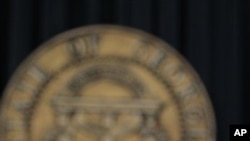Former U.S. House of Representatives Speaker Newt Gingrich took a small first step Thursday toward a possible bid for the Republican Party’s presidential nomination next year.
During a visit to his home state of Georgia, former representative and House Speaker Newt Gingrich told reporters that he is in the early stages of exploring a run for the presidency next year.
Gingrich announced the launch of an exploratory website - NewtExplore2012.com. “We will look at this very seriously and we will very methodically lay out the framework of what we will do next. And we think the key is to have citizens who understand this is going to take a lot of us for a long time working together,” he said.
Potential presidential candidates often take early steps to gauge public support for a White House run and the potential to raise campaign money, a key requirement in presidential campaigns.
Gingrich is a former representative from Georgia who became a national political figure in the 1990s, after he helped Republicans win back control of the House of Representatives for the first time in 40 years in 1994.
Gingrich became speaker of the House in 1995 and later clashed with then Democratic President Bill Clinton over government spending. That clash led to the last major federal government shutdown in 1995 and 1996.
Gingrich resigned his seat in Congress in 1998, after Republicans suffered losses in the midterm elections that year. Since then, Gingrich has written books, given public speeches and appeared as a political commentator on television.
Gingrich is popular with many Republicans and he has high name recognition - two factors that could help him in what is expected to be a crowded primary field next year.
But Quinnipiac University political pollster Peter Brown says that aside from Republican voters, Gingrich is seen as a polarizing figure by many Americans. “Mr. Gingrich’s poll numbers are not particularly good. Voters view him in a somewhat unfavorable light - not gigantically unfavorable, but their memory of him is not a net positive,” he said.
So far, the field of potential Republican presidential candidates is slow to take shape. That is a big change from the last election cycle in 2008, when virtually all of the major candidates had announced their campaigns by this time in the election cycle.
Public opinion polls show that the most popular potential Republican candidates include former Massachusetts Governor Mitt Romney, former Arkansas Governor Mike Huckabee, former Alaska Governor Sarah Palin and Newt Gingrich.
But Washington-based political analyst Rhodes Cook says the Republicans head into next year’s election without a clear front-runner. “There is no real heir apparent there and in past election cycles the Republicans have been known for having an heir apparent, kind of ready to go,” Cook said.
Even among the better known potential Republican candidates many questions remain unanswered, says pollster Peter Brown.
“Former Alaska Governor Palin has a very strong following among some Republicans. On the other hand, survey data indicate that there are an awful lot of Americans who are not very happy about the prospect of her sitting in the Oval Office. [Former Arkansas Governor] Mike Huckabee is probably the most popular of the well-known Republicans, but it is not clear whether he is going to run,” Brown said.
Perhaps a dozen Republicans are considering a run for president next year, and those who are serious are expected to formally announce their intentions within the next few months.
The Republican nomination contest will begin in earnest early next year with caucus and primary elections in the traditional early states of Iowa, New Hampshire, South Carolina and Nevada. But some debates are already scheduled for this year, including one on May 2 at the Ronald Reagan Presidential Library in California.
Newt Gingrich Explores US Presidential Bid




